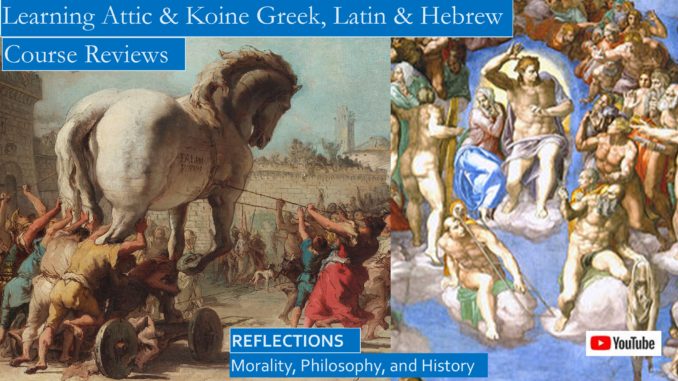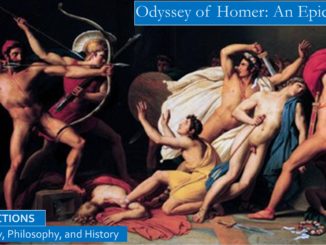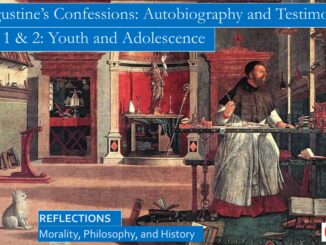
Why would you want to learn how to read ancient Greek, or Latin, or Hebrew?
You would only want to learn these ancient languages if you are truly a serious student, and want to read the Scriptures and classics in their original language, and so you will not miss the word plays and puns that you can only catch in the original language. When reading epic poems of Homer and the Greek playwrights, or the Psalms in Old Testament, or the elegant works of Cicero, you can experience the rhymes and rhythms of the original language, as poetry can be incredibly difficult to translate. When we cut the video for a play by Aeschylus on the Battle of Salamis in the Persian Wars, the various translations we encountered were RADICALLY different. Personally, I am tempted not to read any more Greek plays until I learn how to read Attic Greek.
Note: If you subscribe to Wondrium, the three Great Courses will be included in your subscription.
We will be reviewing two courses for learning ancient Greek, one from Wondrium or the Great Courses, Ancient Greek 101, and another by the evangelical scholar William Mounce on learning New Testament Greek. I wish I could say that I can recommend either or both of these courses as providing the magical keys needed to quickly and easily learn Attic and Koine Greek, but it is really impossible to quickly and easily learn any foreign language, even languages like Spanish that are similar to English, and especially not Greek that is so different from English, and especially for someone like me, who is not very good at learning new languages.
Learning the Greek alphabet is not as difficult as you think, and it is neat to be able to read the Greek when you run across it in your studies. What is interesting is sometimes the Greek letters are assigned to different sounds than the corresponding English letters.
We will also quickly review the Wondrium/Great Courses on Classical Latin, taught by the same professor that teaches the Attic Greek course, and also the Course on learning Biblical Hebrew.
There are not that many differences between Attic and Koine Greek, plus I want to also read Homer, Plato, and the Stoics in addition to the New Testament. Some major differences are that Koine uses the definite articles (i.e., a, an, the) while Attic Greek drops them, plus there are minor differences in the noun declensions and maybe verb conjugations, plus usage differences that creep into any language. Plus, as in all languages, the most commonly used verbs are irregular, and the handful of most used verbs are highly irregular.
Fortunately, many of the theological, scientific, and philosophical words have Greek, Latin, and Hebrew etymologies, so you probably know many more of these ancient than you suspect.
The Latin alphabet has a few minor differences from our English alphabet. And the Hebrew alphabet is, well, in Hebrew. But remember that you read Hebrew from right to left, so you start with A and B, or Aleph and Bet, in the upper right hand corner of the alphabet chart. After that the letters look strange to an English speaker, but once you learn them you can read them. Hebrew also has vowel marks that were missing from the original Hebrew, which originally only had letters for consonants.
BACK TO GREEK
To be clear, Attic Greek is the Greek spoken by Athens, which means that it is also the Greek spoken and written by Plato and the students of Aristotle. And Dr Wikipedia tells me that Homeric Greek also differs somewhat from the standard Attic Greek.
If you have learned a Romance language you know that you need to conjugate the verbs depending on the person (i.e., I, you, we, he/she, they), but in languages like Greek, German, and Latin, you also have to decline the nouns, in Greek the declensions, or noun endings, differ for subjects, objects, indirect objects, and objects of prepositions. Of course, there are many irregular declensions for this or that noun that you just have to memorize.
The implication is that Greek is not a Subject-Verb-Object language, though most sentences are, the nouns and verbs can go anywhere in a sentence, you need to parse the endings and reassemble the sentence. Which means that you can say the words you wish to emphasize first, and Greek is much easier to rhyme than English, which Homer no doubt appreciated.
To shift word order in English you have to jump through hoops. For example, “Amanda walks her German Shepherd” can be rearranged as “Her German Shepherd was walked by Amanda,” if Amanda only thought she was in charge. Of course, Yoda speech backwards mastered he has. Another inspiration is Sister Rosa Tharpe and her pioneering rock and roll song, Can’t No Grave Hold My Body Down.
What this meant for Homer is in both the Iliad and the Odyssey he carefully chose the first word in his carefully worded first sentence. For the Iliad, RAGE – Goddess, sing the rage of Peleus’ son Achilles, murderous, doomed, except that Homer had no need to repeat the RAGE. For the Odyssey, XENIA.
My recommendation is to use both the Great Courses/Wondrium and Mounce courses simultaneously. They use slightly differing memorization tricks, personally I think that is more helpful than confusing. Each approach has its strengths, and you benefit from both approaches. And get the Mounce flashcards and conjugation/declension cheat sheets.
The Great Courses Spanish professor points out that it is not totally true that children learn languages easier than adults. What is true is that children have no choice if they need to communicate, and they literally have years to dedicate to nothing but to learn the language, and they make lots of mistakes along the way. What is true is you need consistent effort over a long period of time to master a new language.
Professor Mounce also makes the point that what seems really foggy when you are on lesson three is much clearer during lesson five, which is then the foggy lesson. So be patient and keep progressing, and since you will never need to use ancient Greek in a restaurant you never have to worry about conversant, and don’t listen to Mounce on just this one point, don’t feel bad if you have to use the conjugation/declension charts forever, because once you arrive in Heaven you will understand it perfectly.
Can you order using Koine Greek in a Greek restaurant, or on a Greek vacation? You can try, and they may understand you, depending on whether they took ancient Greek in school, or if they practice Koine Greek in the Divine Liturgy on Sunday mornings. Dr Wikipedia knows everything, and I asked him, and he said that there was a movement soon after Greek Independence to make classical Greek the official language rather than Demotic Greek, which has Turkish influences. However, the common Demotic Greek was made the official language, but you can still try it out in a Greek restaurant if you wish.
https://en.wikipedia.org/wiki/History_of_Greek#Modern_Greek
You may have better luck ordering in Biblical Hebrew in a restaurant in Israel, as they adapted classical Hebrew as their language, though you probably want to get a tourist book of Hebrew phrases so you know the modern words for restaurant words. But do not try ordering using Latin in an Italian restaurant.



Be the first to comment